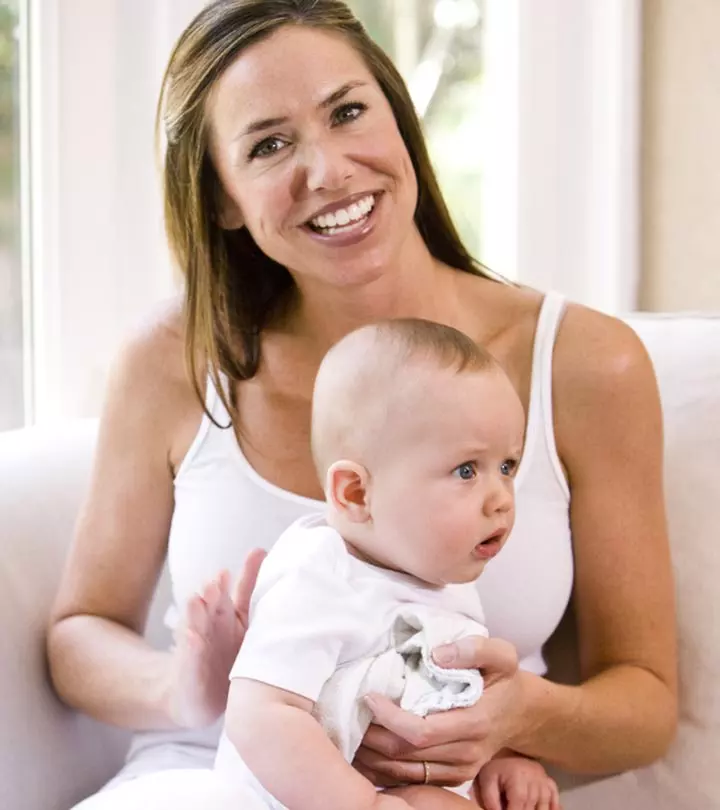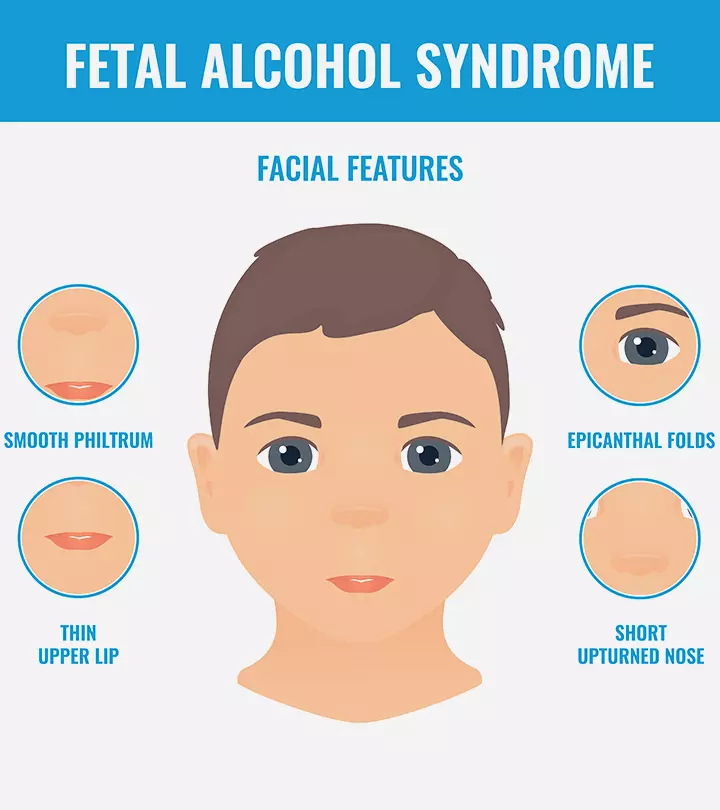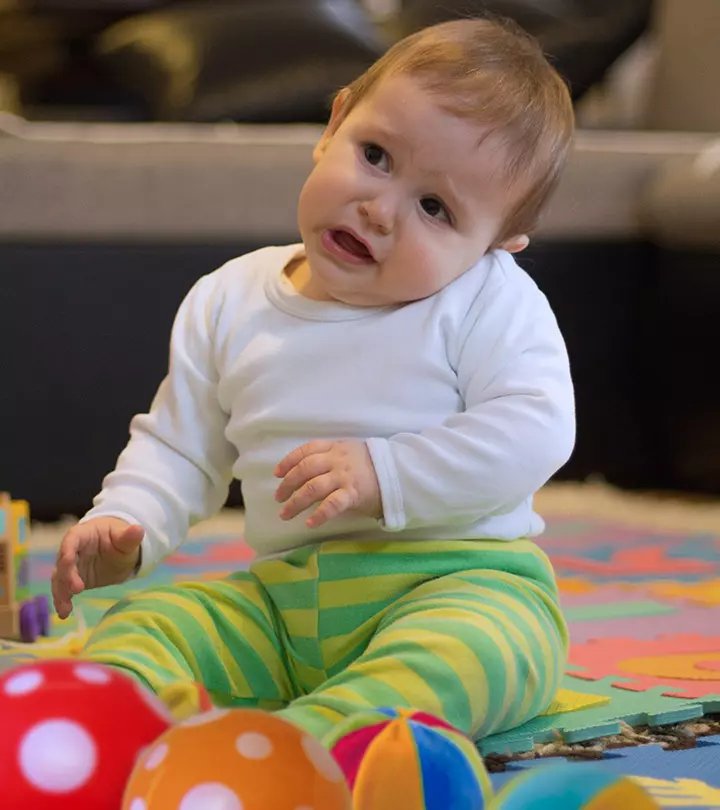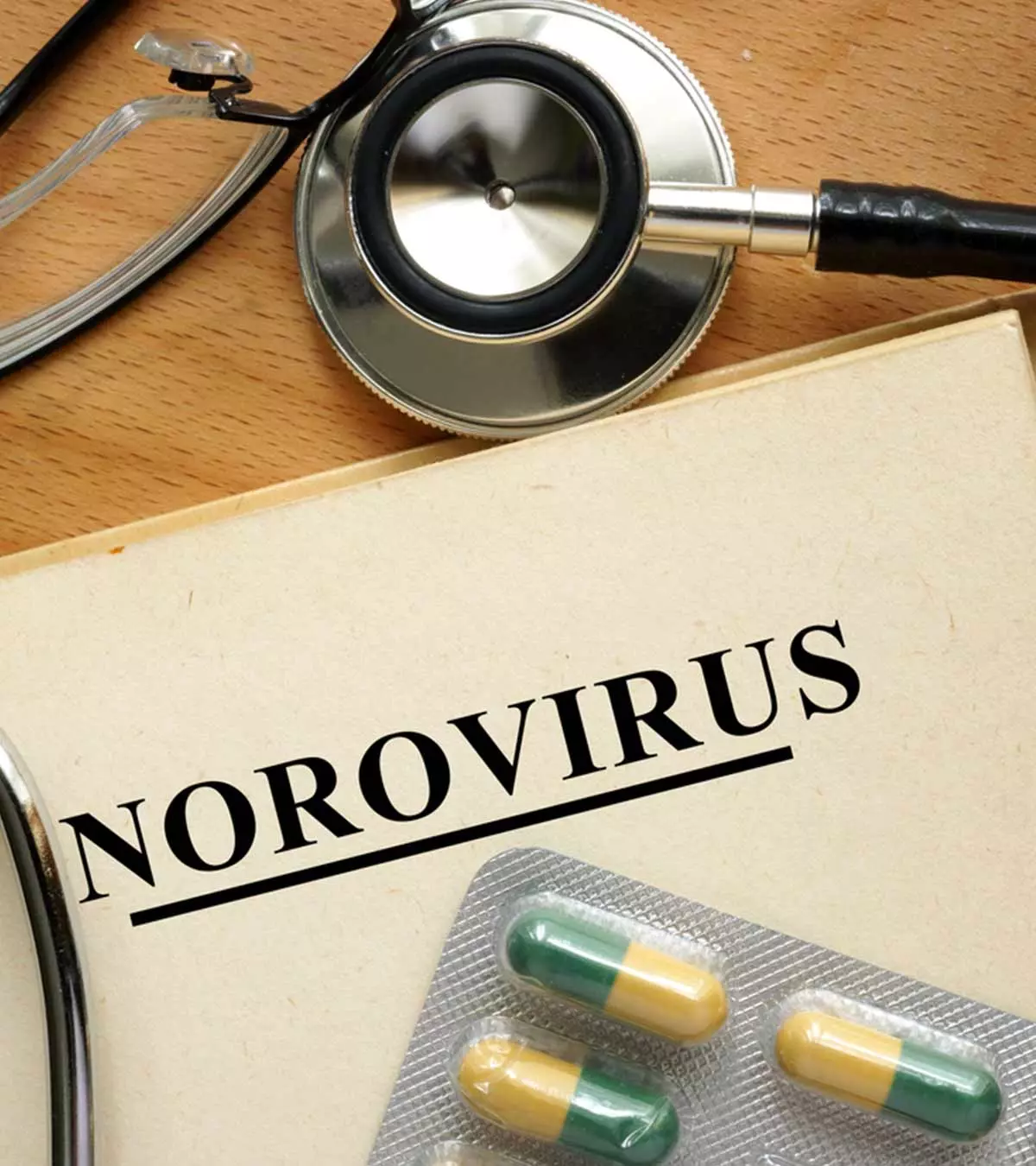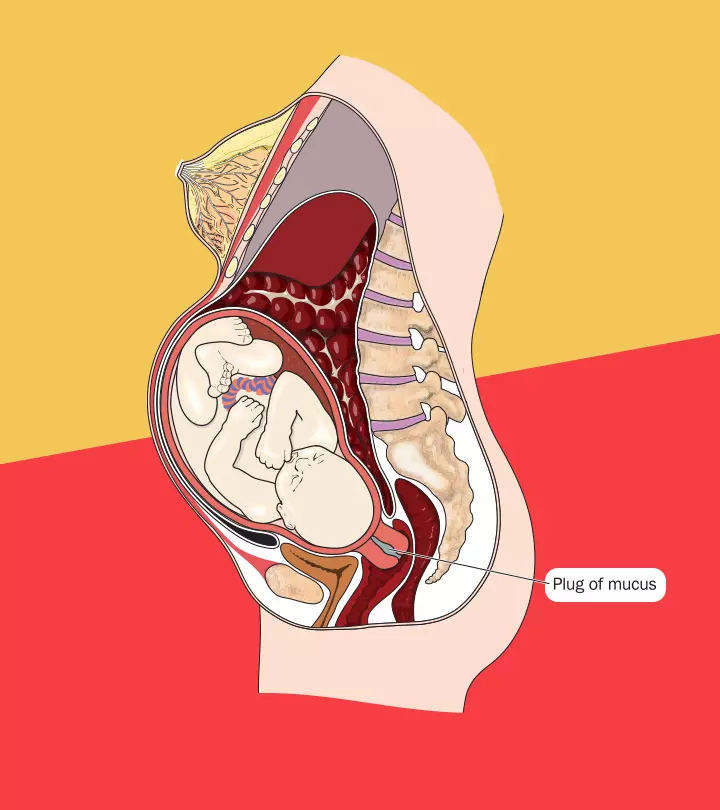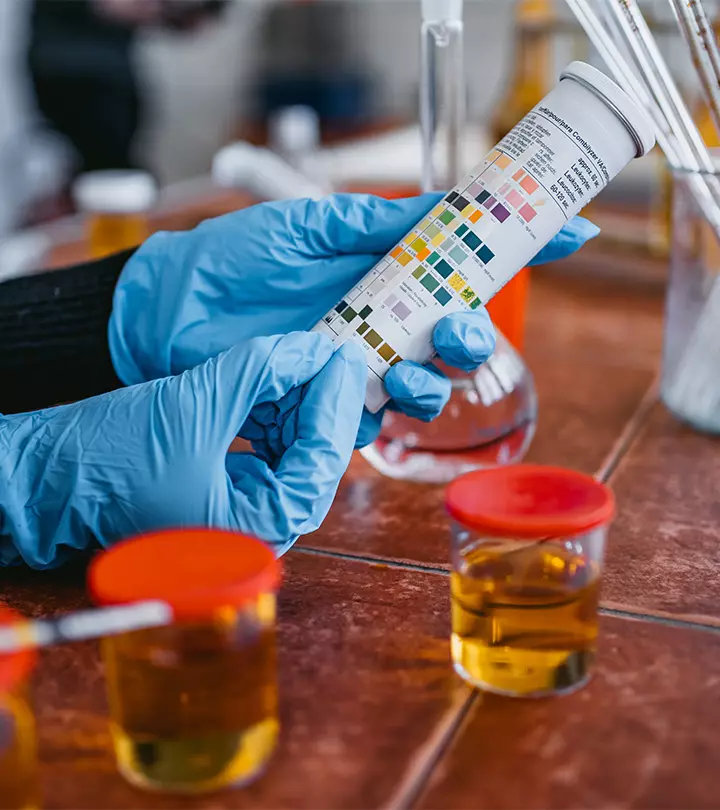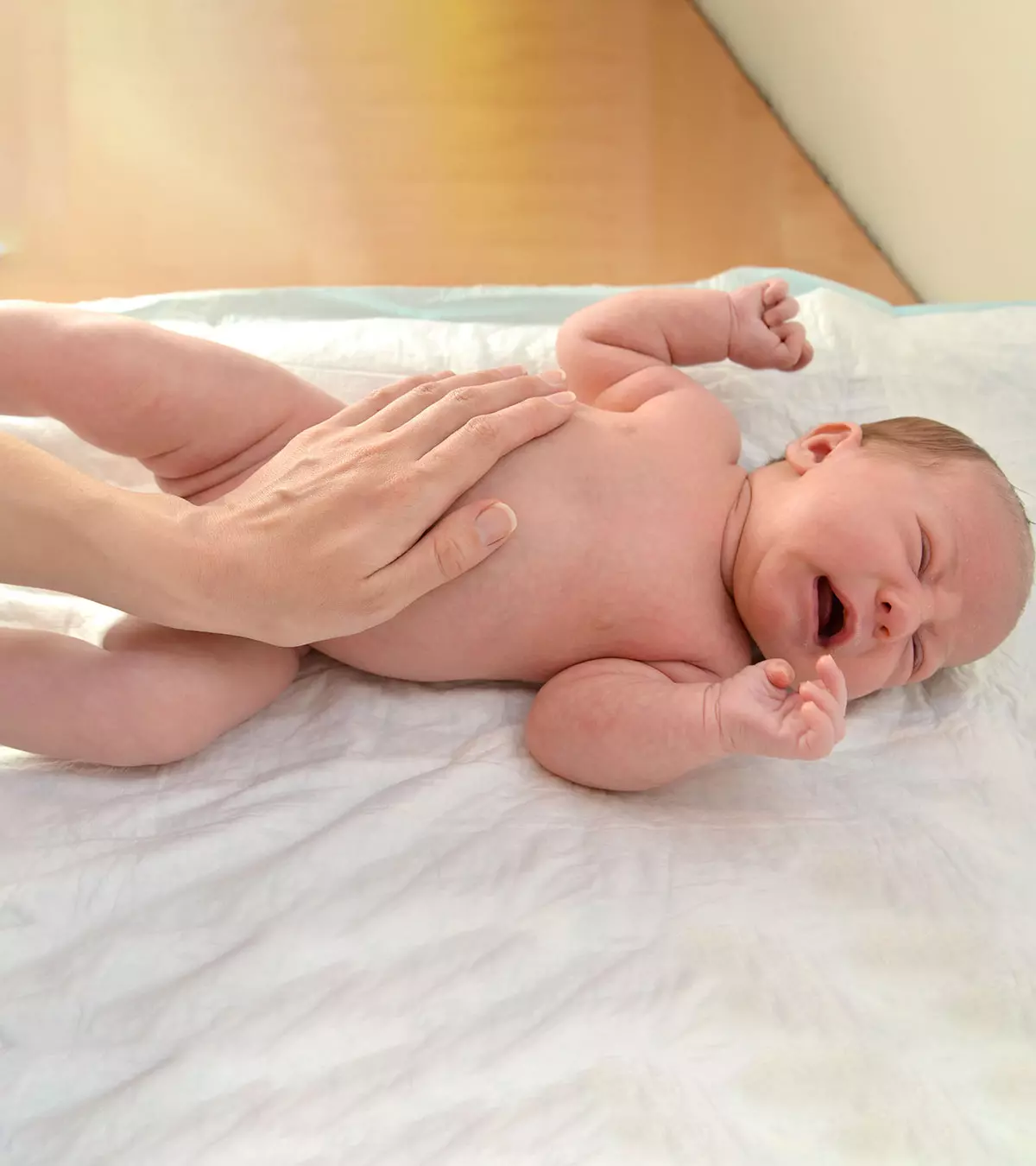
Image: Midjourney/ MomJunction Design Team
A baby’s stool has a typical appearance due to their formula- or milk-only diet. However, some parents may fret over the appearance of mucus in baby stool. The appearance of mucus in your baby’s diaper is not always a cause of concern; however, at times, it may be seen due to some underlying cause.

Read this post to know more about the causes, diagnosis, and treatment of mucus in your baby’s poop.
Key Pointers
- Some mucus in the baby’s stool is normal and a part of the body’s normal function.
- Excessive mucus or mucus with other symptoms like blood in stool indicates an underlying problem.
- Identifying the precise cause and timely initiation of treatment can help mitigate the risk of complication.
What Is Mucus In Poop?
Mucus is a natural, jelly-like secretion produced by the mucous cells present across the gastrointestinal gastrointestinal tractiPathway from the mouth to the anus through which food passes. . Mucus provides lubrication within the intestine and also works as a barrier between bacteria and the epithelial cellsiCells that coat the inside and outside of the body, including organs, blood vessels, and skin. that line the inside of the intestines (1) Secretions, such as saliva and snot, from other parts of the body, are also types of mucus.
Swallowed saliva and nasal mucus reach the gastrointestinal tract where they combine with the mucus secreted in the digestive system. Mucus travels with the waste generated by the intestine and is eventually discarded through stools (2) Therefore, having some mucus in baby stool is normal and a part of the body’s normal function.
According to Dr. David Berger, a Greater Tampa Bay Area-based board-certified pediatrician, “Mucus in a baby’s stool does not necessarily mean something is wrong. It is naturally secreted by the intestines to help the stool move along.”
Knowing how to identify mucus in the baby’s everyday stools will help you determine whether or not it is normal, but what does mucus in baby poop look like? Read on to understand how to identify the presence of mucus in your baby’s stool.
How To Identify Mucus In Baby’s Stool?

Dr. Berger says, “A baby who consumes breast milk is more likely to produce stool that contains mucus, and being naturally yellow and of loose composition, it can be difficult to determine how much of the stool is mucus.”
- Clear strings and striations in the poop. It appears as streaks on the stool.
- Gel-like coagulation. You will see lumps of stool with a gel-like consistency.
- Shine or glisten of the stool, similar to a gel.
Your baby’s stool will not look abnormal when the amount of mucus is normal. It is when the mucus in baby stool is in excess or accompanied by another symptom that it becomes a sign of a problem.
Exclusive breastfeeding in infants generally causes mucous or watery tools; however, the stool consistency can further be subdivided. The graph below shows stool consistency in babies with an exclusive breastfeeding diet. The data suggest that the infants aged 0-1 month had the highest percentage of watery stool (64%), while as they grow older, there is an increase in the rate of mucousy stool consistency (67%).

Stool consistency in exclusively breastfed infants (0-5 months)
Source: Characterizing Exclusively Breastfed Infant Stool via a Novel Infant Stool Scale; Journal of Parenteral and Enteral NutritionWhen Can Mucus In The Baby’s Stool Be A Cause Of Concern?
The following signs of mucus in baby stool could indicate a problem:
- Excessive mucus. The feces is entirely slimy, and the infant consistently poops that way. The excessive mucus may also appear as white puddles in the poop.
- Mucus contains blood spots. Poop is gooey and includes tiny red spots of blood.
- Baby cries while pooping due to the discomfort they experience when they poop.

- Other symptoms of ill health such as stomach ache, fever, poor appetite, and general lethargy.
Take your baby to a doctor if you see these signs or if you suddenly notice mucus in stools. Keep track of your baby’s stool patterns and note any changes in consistency, frequency, or color. This ongoing observation can help healthcare providers identify any potential health issues.
What Could Cause Excess Mucus In The Baby’s Poop?
Pediatrician and neonatologist Dr. Supriya Wakchaure says, “If a baby is feeding well, gaining weight, and generally happy, occasional mucus is not an issue. However, persistent mucus that is thick, green, or streaked with blood could indicate cow’s milk protein intolerance, a gut infection, or an imbalance in breast milk intake.” Here are some conditions that cause excessive production of mucus by the mucous membranes.
- Irritable bowel syndrome: A genetic ailment characterized by problems of bowel movement such as abdominal pain, diarrhea, and the presence of excessive white-colored mucus. Patients with irritable bowel syndrome (IBS) consistently produce excess mucus (4) (5). At least 25% (1 out of 4) of the time, the stool will contain surplus mucus (5).
- Intussusception: A condition where a section of the intestine collapses and folds on itself to create a ring-like blockage. It is most common among babies between the ages of five to nine months (6). Intussusception can cause the baby to excrete jelly-like, mucus-ridden stools (7).
- Ulcerative colitis: It is chronic inflammation of the large intestine. Irritation of the bowel, pain, and mucus in stools are common symptoms (8). Ulcerative colitis is one of the many inflammatory bowel diseases (IBD) (9).
- Cystic fibrosis: A genetic disorder that leads to excess production of mucus. It leads to the accumulation of excessive mucus in the lungs and digestive system (10). Infants with the condition may excrete more mucus than usual.
- Intestinal infection: Several intestinal pathogens can lead to the passage of more mucus in stools, such as, E. coli bacteria (11), and parasites (12).
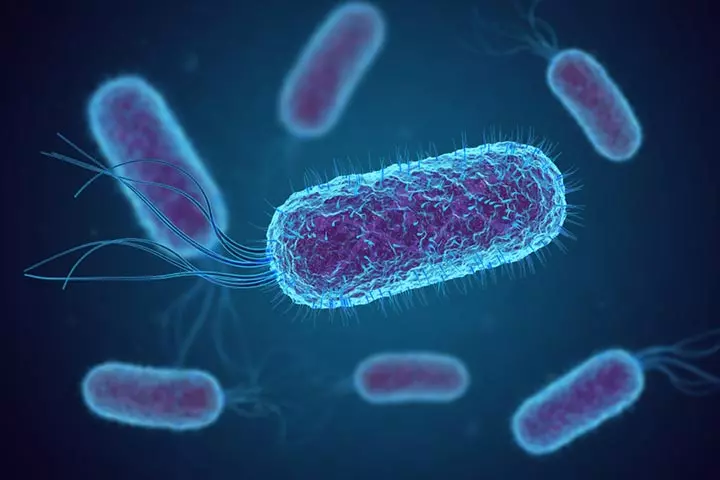
- Bowel polyps: These are small growths emerging from the inner lining of the gastrointestinal tract. They often lead to rectal bleeding and mucus in stools (13). Polyps in infants and toddlers are called juvenile polyps (14).
- Allergies: An infant with allergies and food intolerance can excrete mucus in their stool. This happens because of the inflammation of the intestine due to ingestion of an allergic food (15). According to the Centers for Disease Control and Prevention (CDC), in 2025, among children aged between 0-17 years, 5.8% of children had food allergies. If your baby has recently started a new food, it may be helpful to monitor any changes in stool consistency (20).
Conditions that cause excess mucus in baby stool can also lead to other symptoms such as blood in the stool, abdominal cramps, poor appetite, and diarrhea. It means mucus is more likely to be obvious when your baby has mucus due to a problem.
 Quick fact
Quick factDiagnosing The Causes Of Excess Stool Mucus
The doctor performs the following tests to determine the presence of any problem:
- Physical and visual examination: The doctor will feel for any swelling or anomaly in the abdominal cavity by touching the abdomen. The rectal opening may be checked for the presence of any problem or protrusion of a bowel polyp.

- Stool test: A lab analysis of the stool sample determines the quantity of mucus and also the presence of any pathogen.
- X-ray: An X-Ray provides a picture of any obstruction within the intestines.
- Ultrasound: A standard abdominal ultrasound provides details of the gastrointestinal tract, the presence of polyps, and blockages.
- Colonoscopy: A procedure in which the doctor inserts a probe into the large intestine through the rectal opening. The probe contains a camera to observe the inner lining of the intestine.
Colonoscopy may be used as a last resort when other diagnostic methods fail or provide inconclusive results. Infants and toddlers undergoing this procedure will be under the influence of general anesthesiaiIt is a medication that keeps patients pain-free throughout surgeries, dental treatment, or diagnostic procedures (16).
The test results will help the doctor determine whether the mucus is due to a temporary issue or a more serious condition. This will guide them in deciding the best treatment approach.
Does Mucus In The Baby’s Stool Require Treatment?
Normal amounts of mucus in the stool do not warrant treatment. However, excess mucus accompanied by other symptoms will need management. Here is what is done to treat excess mucus in baby stool:
- Medication to treat the infections. Babies may be prescribed antibiotics such as azithromycin or fluoroquinolone in case of intestinal infections. The child may also be advised to use oral rehydration salts (ORS) solution or intravenous fluids, depending on the severity of their condition (11). The baby will stop pooping mucus-laden stools once the pathogen is eliminated. Medications may also be prescribed in the case of irritable bowel syndrome, intussusception, cystic fibrosis, and ulcerative colitis (21) (6) (8).
- Changes in the mother or child’s diet. In cases of allergic colitis in a breastfeeding child, the doctor may suggest that the mother remove cow’s milk from her diet entirely. The child may be given a hypoallergenic formula for the first 72 hours following this maternal dairy restriction. Once the mother’s breast milk becomes dairy-free, the baby will begin nursing again. The baby will be continually observed for three to four weeks for a gradual decrease in symptoms and improved weight gain (15). In babies who eat solid foods, removing the suspected allergeniA substance that can cause an allergic reaction in people who are sensitive to it can help subdue gastrointestinal allergy. The doctor will also suggest alternative food options to replace the allergen along with high-fiber foods to improve the mucus barrier. Fiber-rich foods may also help in the production of good bacteria in the body (19).
“Young infants are much less likely to have food allergies if breastfed than bottle fed. If a formula-fed baby experiences allergies, I will determine if the formula contains cow milk protein, and if it does, I typically recommend goat milk-based products that may be tolerated when the cow-based formula is not,” shares Dr. Berger.
- Surgery may be necessary in the case of severe Intussusception and inflammatory bowel disease. Surgery may also be recommended in cases of severe parasitic infections, bowel polyps, and cystic fibrosis (10) (12) (13).
- Long-term management is necessary in the case of genetic diseases that often do not have a definitive cure. Effective management as suggested by the doctor is the only way to alleviate the symptoms like excess mucus in the stools.
Frequently Asked Questions
1. Can teething cause mucus in a baby’s poop?
It is believed that the saliva produced during teething may be seen in the baby’s poop (17). However, no studies indicate a definite correlation between teething and mucus in a baby’s poop.
2. Can a cold cause mucus in baby poop?
Cold causes excess mucus production in the lungs and the nose. The baby may swallow this mucus, and it may be expelled through poop. However, not all babies who develop a cold may show mucus in their poop.
3. Can drooling cause mucus in baby poop?
Drooling may cause mucus in baby poop (18). The excess saliva may irritate the intestine, increasing the chances of mucus in the stool. However, it may not happen with all babies who drool excessively.
The appearance of mucus in a baby’s stool is expected due to their formula or exclusive breastmilk diet. However, excessive mucus and other signs, such as crying when pooping, fever, stomachache, or blood in the baby’s stool, may indicate an underlying condition. So, if you notice abnormalities, make an appointment with your child’s doctor for the correct diagnosis and treatment. Once the underlying issue is treated, the amount of mucus in the baby’s stool will return to normal. Medication and dietary changes are the most common treatments; however, surgery and long-term treatment may be required in the case of a severe medical problem.
Infographic: Mucus In Baby’s Stool
Parents often fret over the appearance of mucus in their baby’s stool. However, it is normal and not always a cause for concern. Check out this infographic to learn about:
- Appearance of mucus in baby’s stool
- Possible causes of mucus in baby’s stool
- When to worry

Illustration: Momjunction Design Team
Illustration: What To Do About Mucus In Baby&039s Stool
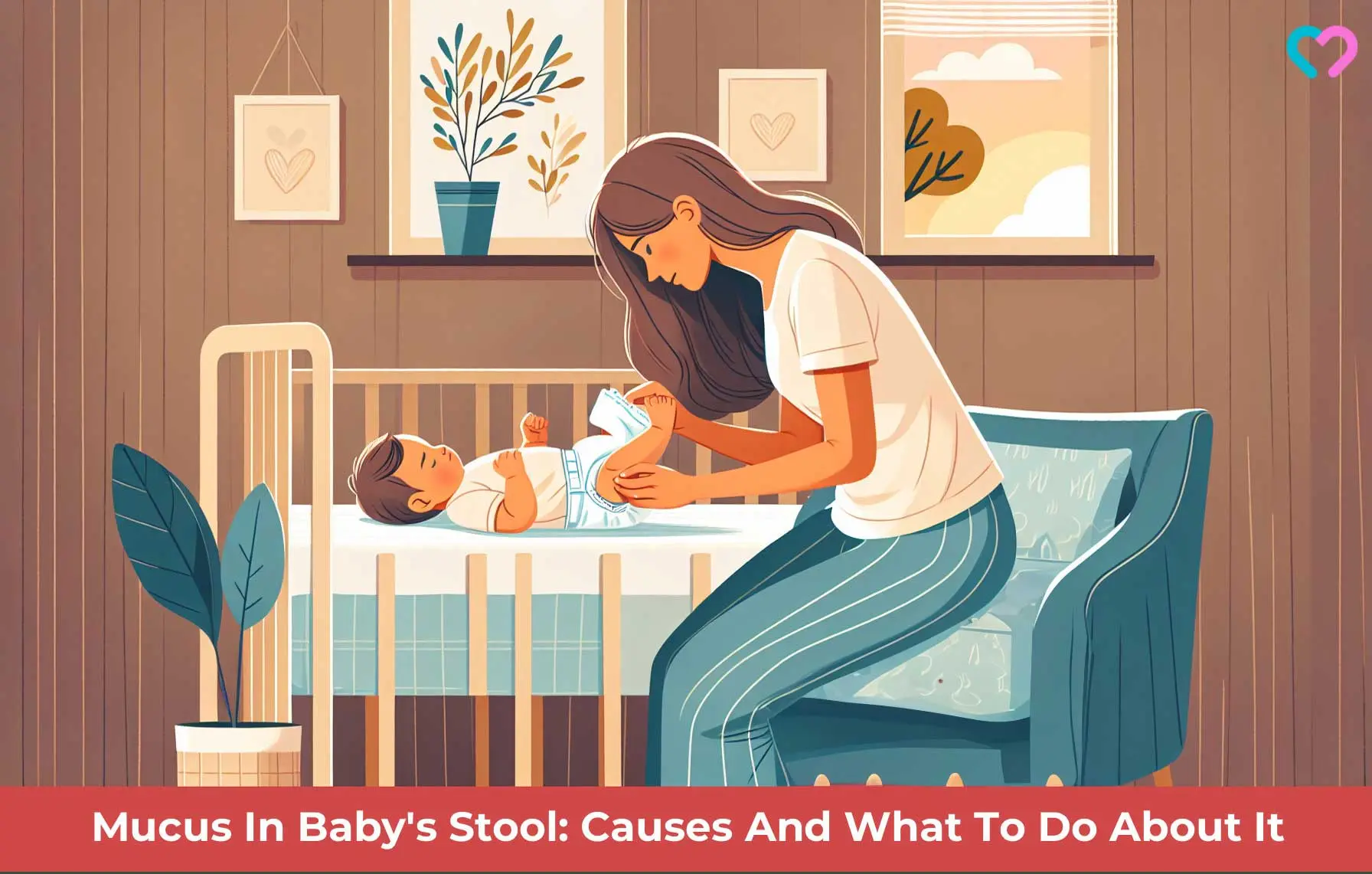
Image: Dall·E/MomJunction Design Team
This video serves as a helpful guide to understanding mucus in baby poop. Learn what it looks like and when to be concerned.
References
- Steve Cornick, et al.; Roles and regulation of the mucus barrier in the gut
https://pmc.ncbi.nlm.nih.gov/articles/PMC4372027/#:~:text=Mucus%20performs%20various%20functions%20in,reaching%20and%20damaging%20the%20epithelium. - Mucus Does More Than You Think; Massachusetts Institute of Technology
https://scopeweb.mit.edu/mucus-does-more-than-you-think-8b12f8f6feae?gi=1cfc6ed1c547 - 5 Signs You Have Irritable Bowel Syndrome; Franciscan Health
https://www.franciscanhealth.org/community/blog/5-signs-you-have-irritable-bowel-syndrome-ibs - Symptoms & Causes of Irritable Bowel Syndrome; U.S. Department of Health and Human Services
https://www.niddk.nih.gov/health-information/digestive-diseases/irritable-bowel-syndrome/symptoms-causes - H. Vahedi et al. Irritable Bowel Syndrome: A Review Article; National Center for Biotechnology Information
https://www.ncbi.nlm.nih.gov/pmc/articles/PMC4154827/ - Intussusception; Nemours Children’s Health
https://kidshealth.org/en/parents/intussusception.html - Intussusception; Children’s Hospital of Philadelphia
https://www.chop.edu/conditions-diseases/intussusception - Ulcerative colitis; NHS UK
https://www.nhs.uk/conditions/ulcerative-colitis/ - Irritable Bowel Syndrome (IBS) and Inflammatory Bowel Disease (IBD); American Academy of Pediatrics
https://www.healthychildren.org/English/health-issues/conditions/abdominal/Pages/Irritable-Bowel-Syndrome-IBS-and-Inflammatory-Bowel-Disease-IBD.aspx - Diagnosed With Cystic Fibrosis; Cystic Fibrosis Foundation
https://www.cff.org/What-is-CF/Diagnosed-With-Cystic-Fibrosis/ - Infectious Diseases Related to Travel; Centers for Disease Control and Prevention
https://wwwnc.cdc.gov/travel/yellowbook/2025/travel-related-infectious-diseases/escherichia-coli-diarrheagenic - E. M. Hechenbleikner & J.A. McQuade Parasitic Colitis; National Center for Biotechnology Information
https://www.ncbi.nlm.nih.gov/pmc/articles/PMC4442724/ - Bowel polyps; NHS UK
https://www.nhs.uk/conditions/bowel-polyps/ - C.A. Durno Colonic polyps in children and adolescents; National Center for Biotechnology Information
https://www.ncbi.nlm.nih.gov/pmc/articles/PMC2657698/ - Allergic Colitis; Boston Children’s Hospital;
https://www.childrenshospital.org/conditions-and-treatments/conditions/a/allergic-colitis - Colonoscopy with General Anesthesia Infants and Toddlers; Nationwide Children’s Hospital
https://www.nationwidechildrens.org/family-resources-education/health-wellness-and-safety-resources/helping-hands/colonoscopy-with-general-anesthesia-infants-and-toddlers - Your Infant is Teething: Know the Signs and Symptoms
https://www.chla.org/blog/rn-remedies/your-infant-teething-know-the-signs-and-symptoms - Is Green Baby Poop Normal?
https://americanpregnancy.org/healthy-pregnancy/first-year-of-life/green-baby-poop/ - Mucus In Stool – Causes Symptoms and Treatment Options.
https://www.narayanahealth.org/blog/mucus-in-stool-causes-symptoms-treatment-options - Diagnosed Allergic Conditions in Children Aged 0–17 Years: United States, 2025
https://www.cdc.gov/nchs/products/databriefs/db459.htm#:~:text=Key%20findings-,Data%20from%20the%20National%20Health%20Interview%20Survey,5.8%25%20had%20a%20food%20allergy - Treatment for Irritable Bowel Syndrome; U.S. Department of Health and Human Services
https://www.niddk.nih.gov/health-information/digestive-diseases/irritable-bowel-syndrome/treatment
Community Experiences
Join the conversation and become a part of our nurturing community! Share your stories, experiences, and insights to connect with fellow parents.
Read full bio of Dr. Dur Afshar Agha

Dr. Supriya Wakchaure is a renowned pediatrician and neonatologist from Surat, Gujarat, India. She has worked at top medical colleges and government hospitals, including KEM Hospital, Mumbai and Civil Hospital, Surat. She has presented various research papers. Dr. Wakchaure is the founder of several mother-support groups. Her services include growth and development evaluation management, allergy testing, tonsillitis treatment, congenital disorders evaluation and treatment, among others.
Dr. Supriya Wakchaure is a renowned pediatrician and neonatologist from Surat, Gujarat, India. She has worked at top medical colleges and government hospitals, including KEM Hospital, Mumbai and Civil Hospital, Surat. She has presented various research papers. Dr. Wakchaure is the founder of several mother-support groups. Her services include growth and development evaluation management, allergy testing, tonsillitis treatment, congenital disorders evaluation and treatment, among others.
- Dr. David Berger is a board-certified pediatrician with a clinical experience of over 20 years. He did his Doctor of Medicine, Pediatrics Residency Program at the University of South Florida. Dr. Berger is the founder of Wholistic Pediatrics and Family Care in Tampa. Later, he also found Wholistic ReLeaf (formerly called Family Medical Cannabis Clinic).
 Dr. David Berger is a board-certified pediatrician with a clinical experience of over 20 years. He did his Doctor of Medicine, Pediatrics Residency Program at the University of South Florida. Dr. Berger is the founder of Wholistic Pediatrics and Family Care in Tampa. Later, he also found Wholistic ReLeaf (formerly called Family Medical Cannabis Clinic).
Dr. David Berger is a board-certified pediatrician with a clinical experience of over 20 years. He did his Doctor of Medicine, Pediatrics Residency Program at the University of South Florida. Dr. Berger is the founder of Wholistic Pediatrics and Family Care in Tampa. Later, he also found Wholistic ReLeaf (formerly called Family Medical Cannabis Clinic).
Read full bio of Rohit Garoo
Read full bio of Dr. Ritika Shah
Read full bio of Ghazia Shah







